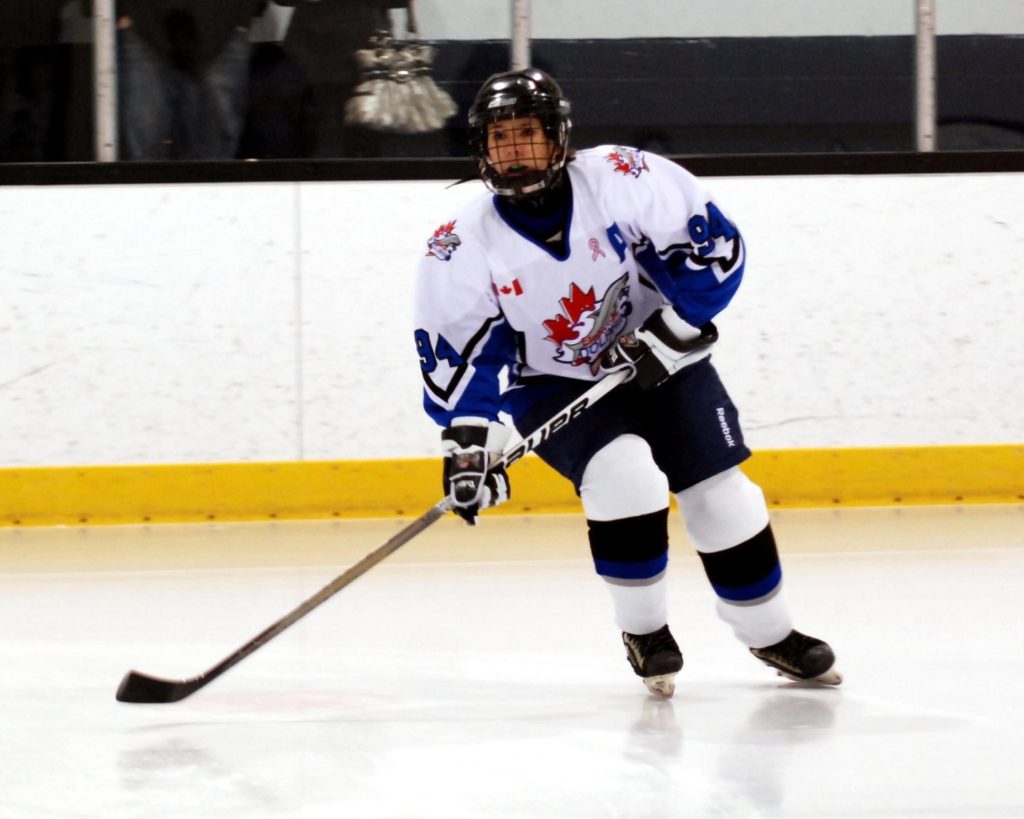“I became a sports nutritionist to help other athletes avoid the mistakes I made with my nutrition growing up, which ultimately stunted my performance.”
As a child, I was put on skates within the same year I started walking. Initially, it was figure skates, but eventually, I traded them for hockey skates and started playing ringette. However, when the league I played in suddenly folded when I was 10 years old, my parents signed me up for hockey. From that moment on, I never looked back.
Within two years of playing hockey, I made the travelling team, made from the top house league players. Then, I started making my way up through the rep ranks each season. By high school, I was playing on A level teams for the Etobicoke Dolphins.
Since there was no local girl’s hockey team, my family was traveling a minimum of 45 minutes one-way just for me to attend practices and home games. Away games could be two to three hour drives in one direction.
The first costly mistake I made for my hockey “career” was deciding to attend a small Canadian college (without a hockey team) instead of going to university. We didn’t know what we didn’t know back then about how to further my hockey opportunities and future. But looking back, it is still one of my biggest regrets.
Early Nutrition Influences
When I was around 16 or 17 years old, I was playing A level hockey and I really started to care about performance nutrition (or what my understanding of performance nutrition was).
I vividly remember going into a GNC supplement store and buying Gatorade products because Sidney Crosby was in Gatorade commercials. That meant I obviously needed all the Gatorade products too, right?
I was getting all of my nutrition information from Women’s Health Magazine, SHAPE Magazine, Dr. Oz, and other random websites I found. So when I wasn’t downing sports nutrition products, I was definitely under-fuelling and not getting the right nutrients for a developing athlete’s body.
I wanted to look like the women I saw in those magazines, obviously not realizing many of them were fitness MODELS and not ATHLETES. If they were athletes, they certainly weren’t hockey players.
In my 20s, I started trying popular diet trends, juice cleanses, strict calorie counting, and following tons of food rules, all in the name of having “abs” and staying thin. Because that’s how I thought I was supposed to look. In the name of “eating clean”, I started eliminating added sugar, salt, gluten, and processed foods from my diet. I used MyFitnessPal for a solid two to three years straight to track all my food, workouts, and measurements.
Not only did I waste a lot of money on unnecessary supplements I didn’t even know how to use properly, but the poor nutrition strategies I was following likely led to the string of chronic injuries I started to suffer from. Season after season, I started missing more and more practices and games until I eventually stopped playing hockey altogether from 2015 to 2023 due to post-concussion syndrome.
Taking my passion for nutrition to the next level
In 2014, when I began studying to be a nutritionist, I discovered a link between my childhood diet and various health issues. A lot of my childhood ailments were connected to allergies, food sensitivities, and major inflammation in my body that later contributed to my injury history. The foundation I was trying to build on couldn’t withstand these challenges and the pieces came crumbling down.
When I started studying Sports and Exercise Nutrition, I learned the importance of improving health, performance, and body composition all at the same time, without sacrificing one for the other. I learned about balance and recovery. I learned about healthy nutrition, exercise, and lifestyle habits that are SUSTAINABLE.
I was able to take what I learned and apply it to my training and competing as an obstacle course race athlete. Between 2013 and 2019, I competed in over 60 obstacle course races, including the 2016 and 2018 OCR World Championships and 2019 North American OCR Championships. I earned a 2nd place age group podium finish at a Spartan Super and a 3rd place age group podium finish at a Savage Race in 2018.
I became a sports nutritionist to help other athletes avoid the mistakes I made with my nutrition growing up, which ultimately stunted my performance. My mission is to help the next generation of athletes optimize their nutrition so they can optimize their performance on and off the ice.
While the landscape of sports nutrition has evolved significantly, there remains a persistent trend among teen athletes who continue to focus on calorie counting for weight loss and experiment with fad diets, follow social media trends, or resort to questionable supplements. Contrary to seeking guidance from traditional sources like magazines, teens now encounter poor nutritional advice on social media platforms. And of course, the influence of professional athletes endorsing products and getting sponsored by supplement companies that don’t actually support sports performance or health continues to be a concern. Notably, figures like Auston Matthews who recently aligned with PRIME, a controversial beverage company with a history of energy drink recalls in Canada. While Matthews’ partnership seems to involve PRIME hydration, the distinction may not be clear to young athletes. Moreover, PRIME’s marketing presents its hydration drinks as a sports drink alternative, despite not being a true sports or hydration drink for athletes.
In short, not enough teenage athletes and their parents are receiving advice from credible sources. Youth sports teams and clubs should involve qualified nutrition experts, but they often don’t. While it’s good that these groups set aside money for strength and conditioning coaches or personal trainers, they may not be the most suitable resources for nutrition.
What I teach my clients
With a prioritization of performance over aesthetics, my programs and coaching are designed to help teen and adolescent hockey players become the healthiest and strongest versions of themselves in the most sustainable way possible.
A solid nutrition foundation goes beyond what to eat before, during, and after training sessions, practices, and games. An athlete’s day-to-day diet is more important for their performance, health, and longevity in sport. Even top-performing players will have moments where they are unable to perform their best if they aren’t well-nourished.
Counting calories or tracking macros doesn’t necessarily mean you’re feeding yourself appropriately. Just because you eat clean, organic, gluten-free, avoid added sugar, have a visible six-pack, or have performed well up to now, doesn’t guarantee that your nutrition is on point, that you eat enough, or that you know what you’re doing when it comes to fuelling for optimal performance and health.
Most athletes I’ve spoken to lack a strong foundation of nutritional habits. They do some things well, some of the time. But the consistency just isn’t there.
They don’t eat properly balanced meals based on their training load. They don’t eat regular meals. They don’t know how to listen to their hunger and fullness cues. They don’t eat enough carbs, protein, vegetables, or fibre. They don’t eat slowly or mindfully. They don’t have a reliable meal planning and prepping routine.
As I transitioned from a hockey player to a sports nutritionist, I’ve learned firsthand the transformative power of nutrition in shaping athletic performance and overall well-being. These personal experiences fuel my commitment to steer the upcoming generation towards a healthier approach to fuelling. In a world cluttered with fad diets and questionable endorsements, I strive to bridge the gap between athletes and proper nutritional guidance. My coaching philosophy emphasizes performance over aesthetics, advocating a holistic understanding of nutrition that extends beyond mere calorie counting or macro tracking.
Melissa Boufounos is a certified holistic nutritionist, nutrition writer, and lifelong athlete living in the greater Ottawa area. She specializes in sports nutrition and mainly works with teen and adolescent hockey players in her virtual private practice MB Performance Nutrition.
Where you can find Melissa:
Website: https://
Instagram: https://www.


